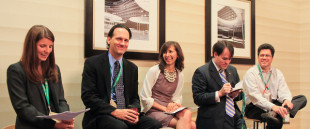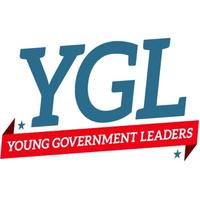
The Next Gen 2013 Experience: A First Timer’s Perspective
September 3, 2013 | By Kaylan Billingsley, YGL G.O.L.D. Fellow
Published on FedManager
The Next Generation of Government Summit takes place every year in July, and is attended by government employees from all over the country. As a first-timer, I had the benefit of not only being able to gain perspective of the summit as an attendee, but I also had the opportunity to attend as a volunteer as well.
As a graduate student looking to re-energize my career path in the next year, I have the tendency to approach the questions “what makes a good leader” and “what makes a good employee” from an academic perspective. I figured that it is the knowledge of the person’s respective field that is the only thing that really elevates people in their careers. After attending Next Gen, listening to the speakers and breakout sessions, I have realized that there are qualities and skills that transcend field-specific knowledge that are equally as important to leadership in government and building a strong career.
With over 550 plus people in attendance, even during a time when government agencies seek to cut back their budgets, I was already aware of the value and importance of Next Gen’s mission. The conference started off with keynote speaker Jennifer Pahlka, the Deputy Chief Technology Officer & Founder of Code for America. Her speech about how individuals can become agents of change in their government agencies really captured the common goal shared by all in attendance at Next Gen. Her speech was the perfect catalyst for the summit, and definitely energized everyone going into the breakout sessions.
The first breakout session that I was a part of was on How to Become a Better Negotiator, led by Douglas Quartetti, a crisis negotiator for the Bureau of Alcohol, Tobacco and Firearms. Quartetti used his unique experiences as a negotiator in high-stress and dangerous situations and translated those skills into valuable tools for negotiating within the workplace. His session was incredibly engaging and useful, as it helped highlight the important attributes that are universal to negotiating in any professional situation. His suggestion about making your interests known rather than simply stating your position was a really useful idea for negotiating. Rather than simply stating what you want, you should let the other party know why you want it, so that you can open up a productive discussion about how to achieve the best outcome.
The lunchtime speakers also provided a unique perspective on the important aspects of being a leader and an innovator in government. Jeff Friedland Nelson, the Founder and CEO of Play From Scratch provided an entertaining insight into the importance of creativity, and the fostering of individuals’ drive to create every single day. He even used one of the games from his line of toys to get the attendees to create and build things using their own inventive ideas. While on the outside it looked simply like 550 people playing a game with cards and tape, it illustrated the idea that creativity does not have to necessarily be something that is brand-new, but that being an innovator in government can mean taking the tools you already have and improving on them to move agencies forward in being more productive.
After an energized lunch, the second round of breakout sessions saw new skills and new ideas being offered to the attendees. I chose the session Enterprise 2.0 in the Federal Government: Building an Integrated Skills-Set for Smashing Silos and Improving Performance. This session utilized the knowledge of panelists from the Department of State, the Environmental Protection Agency, the Federal Aviation Administration and the International Finance Corporation. They all spoke about the ways in which their respective agencies used the benefits of social media platforms to motivate their employees through crowdsourcing techniques to share ideas and strategies that could improve their agencies’ functionality. One of the more interesting concepts offered was by Kerry O’Connor from the State Department on the author Steven Johnson’s idea of the “adjacent possible.” This concept echoed the lunchtime talk by Jeff Friedland Nelson, in that it talks about not just “thinking outside the box” but using what is already in “the box” and pushing those tools to achieve another possibility that is just outside of what you and your agency are doing right now.
Overall, this particular breakout session was particularly useful because it discredited the idea that IT is the only innovator in government, and that individuals can be innovators if the agencies put in the correct tools to allow those individuals to share their ideas freely.
Finally, for my last breakout session, I decided to take a more technical route and brave the Budget 101 session. Despite the intimidating scope of information that goes with the forming of a federal budget (not to mention the endless congressional rules and political gridlock), Next Gen was offering a valuable look into the important terms and stages of formation in the federal budget. It proved to be a valuable session, as I finally was able to decipher some of the budgetary terms that are routinely thrown into media and agency discussions of federal funding, and I also gained a better idea of how the budget is formed, and the timeline that agencies should use to incorporate federal money into their budgets. Overall, this session allowed for a more technical understanding of the nuts and bolts of “following the money.”
For me, the most memorable and notable experience of the day was the closing speaker, Svante Myrick, the 26-year-old mayor of Ithaca, New York. His talk about why young people should run for office was incredibly moving and definitely kept the group energized after a long day. He was an incredibly charismatic and energetic speaker, and used his own experience of running for office at the age of 24 to inspire the attendees to become active in politics. He cited the energy, creativity, and moral authority of young people as their greatest assets to be agents of change, and that experience is not the end-all be-all of being a leader in government. I was certainly moved by his story and inspired to continue to build my skills so that I could be an agent of change as well.
Overall, my experience at Next Gen was incredible. I came home after a 12-hour day with a surprising amount of energy. Next Gen kept my mind racing on the Metro ride home, and I already started planning ways to implement the skills that I learned within my academic community and developing my future career. Next Gen has proven to be an invaluable experience, as it promotes skills and ideas that transcend agencies. It gives each individual the useful tools that they can bring back to their respective offices and use them to become leaders and driving forces for positive change. What I gained in one day at Next Gen was inspiring and valuable, and I felt very lucky to be a part of such a great conference. I would advocate for any and all agencies in government not to overlook Next Gen because of budgetary constraints. Next Gen will prove to be a wise investment for government as a whole to build young feds’ talents as the future leaders that will move the country forward.

